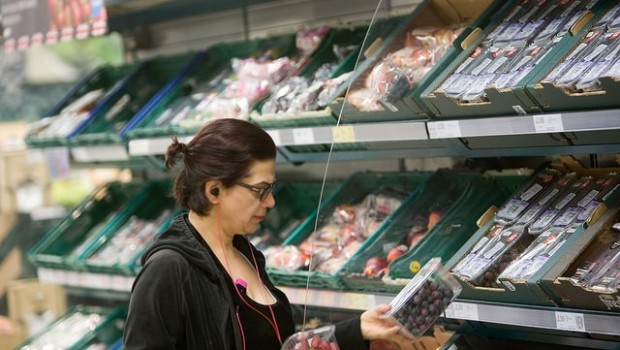Grocery sales stabilise as challenges mount

UK grocery sales stabilised last month, industry research showed on Tuesday, as the sector continued to rebound from the worst of the pandemic.
Food & Drug Retailers
4,446.57
17:14 20/12/24
FTSE 100
8,084.61
17:04 20/12/24
FTSE 250
20,450.69
17:14 20/12/24
FTSE 350
4,463.29
17:14 20/12/24
FTSE All-Share
4,421.11
17:04 20/12/24
General Retailers
4,645.29
17:14 20/12/24
Marks & Spencer Group
379.40p
16:35 20/12/24
Sainsbury (J)
270.20p
16:55 20/12/24
Tesco
366.40p
16:40 20/12/24
According to the latest data from retail consultancy NielsenIQ, total till sales were down 3.4% in the four weeks to 26 February, only marginally weaker than January’s 2.9% decline.
In total, shoppers spent £9.7bn in the UK's main supermarkets during the four weeks, down 4.2% on the same period a year earlier, but ahead 4.4% when compared to pre-Covid levels two years ago.
“Moreover, as shopping behaviour normalises, industry spend per visit is stabilising at £18.50 compared to £21.10 this time last year and is now close to £17.20 of February 2020, suggesting the end of Covid-19 trendlines,” NielsenIQ noted.
The online share of sales also fell back, to 12.5% from 13.1% in January.
However, NielsenIQ also warned that inflation was continuing to mount, with supermarkets facing growing challenges from global food supply disruption and soaring energy costs. Grocery inflation has now risen 2.7% since the start of the year, the highest since September 2013.
Mike Watkins, UK head of retailer and business insight at NielsenIQ, said: “The pandemic may soon be behind us, but new threats are on the horizon. Global food supply disruption and soaring energy and fuel costs, are set to impact shopper baskets and have the potential to slow down any growth in supermarket volumes.
“With promotional spend unchanged at 20% of sales purchased, we can instead see a sharpening of pricing activity with price matches, price cuts, couponing, fuel vouchers and comparative shopping basket advertising.
“Retailers and their suppliers must be prepared for the uncertainty that lies ahead.”
Among individual grocers, Marks & Spencer was the fastest growing over the last 12 weeks, according to NielsenIQ, ahead 12.2%, while its market share was the highest since the fourth quarter of 2017. Hard discounters Lidl and Aldi reported strong growth as well, ahead 8.6% and 6.1%, respectively. Both were expanding their footprint in the UK.
The big four supermarkets all saw sales fall year-on-year. Sales at Tesco were down 1.5%, off 3.7% at J Sainsbury’s, down 4.8% at Asda and off 7.7% at Wm Morrison.
Clive Black, analyst at Shore Capital, said: “Inflation is a materially growing feature of the trade, more so than we felt at the start of the year, and increasingly there looks to be a polarised market of those on the bread line compared to the cash rich.
“Such is the inflationary pressure we now also believe volumes will be negatively impacted if present pressures build, while the retailers seek to prevent trading down.
“Consumer economy conditions in the UK are tightening and, depending upon how matters pan out in Ukraine, they may become genuinely tough for an increasing number of British households; if Putin is to be defeated there is a price to pay.”